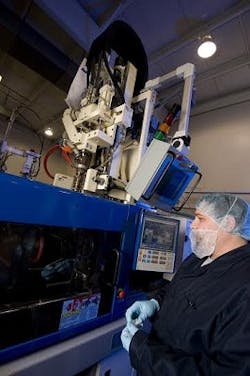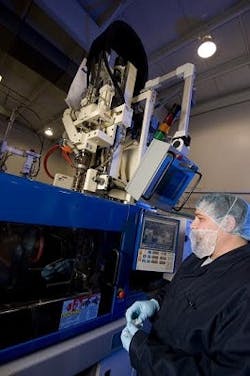Single-use Supplier Evaluates Data Collection, Reporting
ASI partners with Automated Control Concepts to gain manufacturing intelligence through Rockwell Automation solution ASI (Advanced Scientifics Inc.), a producer of single-use systems for biotech, provides single-use bags to a variety of life science and healthcare companies. The company wanted to improve its data collection and reporting capabilities on bag runs, improve quality control for customer orders, and provide each customer with accurate and up-to-date information on the status of their order.
One of ASI's competitive advantages is its ability to quickly customize product to meet customer needs. To maintain this type of flexibility, operators often need to change the configuration of a line to meet the differing specifications, including the size of the order, type of bag and the customer's deadline. With this variety of demands, ASI needed greater visibility into their process to optimize production and provide customers with process and production information on their orders.
For part of the process, operators still had to record some data manually. ASI not only wanted to completely automate the data collection and reporting process, but also wanted a more granular view of each parameter in real time. This would allow them greater control over the process and greater visibility into alarm conditions to reduce downtime.
Such transparency is also important for customers. Consistent documentation and accuracy of each run is essential for compliance for life sciences and healthcare companies. So another goal of the company was to be able to produce high-level reports that would provide customers with the insight they needed into the final product.
SOFTWARE SOLUTIONS
ASI needed the right software to meet their goals, so it turned to Automated Control Concepts Inc. (ACC), a solution partner of the Rockwell Automation PartnerNetwork program, to design and deliver a solution based on the FactoryTalk software from Rockwell.
"Choosing FactoryTalk software was a simple decision because we knew it would integrate seamlessly with our existing Rockwell Automation hardware, meaning minimal changes and interruptions to the process," said Rudy Pavlik, engineering manager at ASI. FactoryTalkVantagePoint software accesses data from points in a run and allows operators to view various parameters on dashboards in real time, including those once manually collected.
For customers, ASI can readily create a report containing high-level process data – including temperature, pressure and time – for each individual part produced.
By using FactoryTalk Historian Site Edition software, ASI operators can record and track time-series data to pinpoint operating trends. "By integrating information from individual machines, as well as throughout the line, we can adjust parameters when and where necessary, which improves efficiency throughout the plant," Pavlik said.
OPERATING EFFICIENCY
ASI's increased visibility into the process has made operations more efficient. Customers, some of whom even visit the plant during production, can view the detailed status of their order – down to the last five bags. "This level of information gives ASI's customers reassurance and confirms the quality of their product," said Michael Blechman, president, ACC.
Pavlik said the Rockwell Automation software has already helped reduce downtime, and they are identifying opportunities to leverage new data for better decision making.

